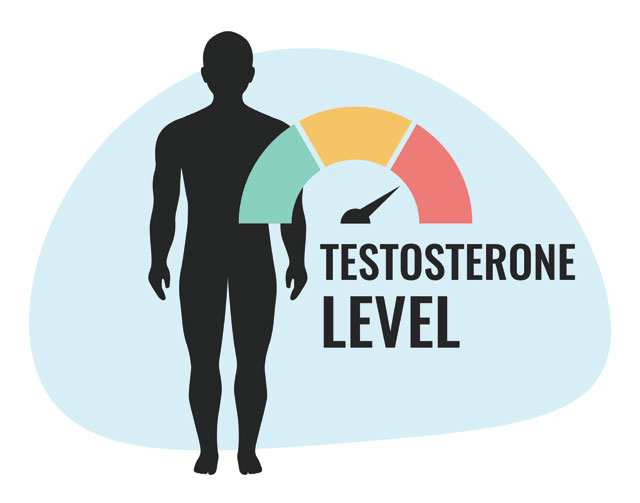symptoms of high testosterone
#Aggressive Behavior and Mood Swings#
 High testosterone levels in individuals, both men and women, can result in a variety of symptoms that impact physical health, behavior, and overall well-being. Testosterone is a crucial hormone in the human body, playing a significant role in the development of male characteristics and reproductive functions. While it is normal to have varying levels of testosterone, excessively high levels can lead to several notable symptoms. Understanding these symptoms is essential for identifying and managing potential health issues associated with hormonal imbalances.Elevated testosterone levels can significantly impact a man's mood and behavior. Men may experience increased aggression, irritability, and mood swings. These behavioral changes can affect personal relationships and professional interactions, leading to potential conflicts and stress.
High testosterone levels in individuals, both men and women, can result in a variety of symptoms that impact physical health, behavior, and overall well-being. Testosterone is a crucial hormone in the human body, playing a significant role in the development of male characteristics and reproductive functions. While it is normal to have varying levels of testosterone, excessively high levels can lead to several notable symptoms. Understanding these symptoms is essential for identifying and managing potential health issues associated with hormonal imbalances.Elevated testosterone levels can significantly impact a man's mood and behavior. Men may experience increased aggression, irritability, and mood swings. These behavioral changes can affect personal relationships and professional interactions, leading to potential conflicts and stress.#Increased Muscle Mass and Decreased Body Fat#
High testosterone levels can stimulate the sebaceous glands, leading to an overproduction of sebum. This excess oil can clog pores and result in severe acne and oily skin. This condition can be particularly challenging for adult men, as it often requires medical intervention to manage effectively.
#Reduced Sperm Count and Infertility#
#Reduced Sperm Count and Infertility#
Paradoxically, very high levels of testosterone can negatively impact sperm production. This hormonal imbalance can lead to reduced sperm count, affecting a man's fertility. Men trying to conceive may find it particularly concerning, requiring medical evaluation and treatment.Elevated testosterone levels have been linked to sleep apnea, a condition characterized by interrupted breathing during sleep. This can result in poor sleep quality, daytime fatigue, and increased risk of cardiovascular problems.
The causes of high testosterone levels can vary widely. In men, it may result from anabolic steroid use, certain medical conditions such as adrenal tumors, or genetic factors. In women, conditions like polycystic ovary syndrome (PCOS), congenital adrenal hyperplasia, and certain ovarian or adrenal tumors can lead to elevated testosterone levels.
Diagnosing high testosterone typically involves a combination of medical history evaluation, physical examination, and laboratory tests to measure hormone levels. Once diagnosed, treatment options may include lifestyle changes, medication,
#Symptoms of High Testosterone in Women#
1. **Hirsutism (Excessive Hair Growth)**:
Diagnosing high testosterone typically involves a combination of medical history evaluation, physical examination, and laboratory tests to measure hormone levels. Once diagnosed, treatment options may include lifestyle changes, medication,
#Symptoms of High Testosterone in Women#
1. **Hirsutism (Excessive Hair Growth)**:
One of the most noticeable symptoms of high testosterone in women is hirsutism, which involves excessive hair growth on the face, chest, and back. .
2. **Deepening of the Voice**:
High testosterone levels can lead to vocal changes in women, including a deepening of the voice. This masculinization effect is often irreversible and can be a source of discomfort and embarrassment for affected individuals.
3. **Menstrual Irregularities**:
Women with high testosterone levels may experience irregular menstrual cycles or even amenorrhea (absence of menstruation). These disruptions can affect fertility and overall reproductive health, necessitating medical intervention to restore hormonal balance.
4. **Acne and Oily Skin**:
Similar to men, women with elevated testosterone levels may suffer from severe acne and oily skin. This symptom is often persistent and may require dermatological treatments to manage effectively.
5. **Increased Muscle Mass**:
High testosterone levels can lead to increased muscle mass and strength in women. While some may view this as a positive outcome, it can be concerning for those who do not wish to develop a more muscular physique.
#Symptoms Common to Both Genders#
1. **Mood Disorders**:
Both men and women with high testosterone levels may experience mood disorders, including depression and anxiety. These psychological effects can significantly impact daily functioning and overall quality of life.
2. **Cardiovascular Issues**:
Elevated testosterone levels have been associated with an increased risk of cardiovascular problems, including hypertension (high blood pressure) and heart disease. Monitoring and managing cardiovascular health is crucial for individuals with high testosterone levels.
3. **Polycythemia (Increased Red Blood Cell Count)**:
High testosterone levels can stimulate the production of red blood cells, leading to polycythemia. This condition increases the risk of blood clots, stroke, and other cardiovascular complications.
Both men and women with high testosterone levels may experience mood disorders, including depression and anxiety. These psychological effects can significantly impact daily functioning and overall quality of life.
2. **Cardiovascular Issues**:
Elevated testosterone levels have been associated with an increased risk of cardiovascular problems, including hypertension (high blood pressure) and heart disease. Monitoring and managing cardiovascular health is crucial for individuals with high testosterone levels.
3. **Polycythemia (Increased Red Blood Cell Count)**:
High testosterone levels can stimulate the production of red blood cells, leading to polycythemia. This condition increases the risk of blood clots, stroke, and other cardiovascular complications.




.jpg)


Comments
Post a Comment